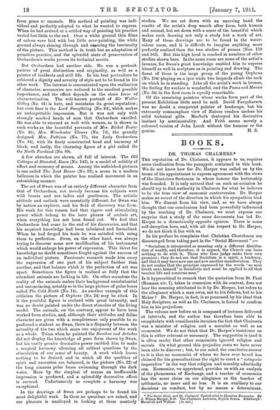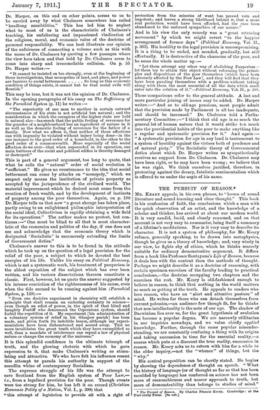BOOKS.
DR. THOMAS CHALMERS.* THE reputation of Dr. Chalmers, it appears to us, requires some vindication from the panegyric contained in this book. We do not know how far Dr. Harper was called on by the terms of his appointment to express agreement with the views of the illustrious Scotsman in whose honour the lectureship was founded. It is only natural that on such an occasion he should try to find authority in Chalmers for what he believes to be the true view of economic controversies. Dr. Harper makes no secret of the direction in which his sympathies lead him. We dissent from his view, and, as we have always thought that our conclusions had been powerfully influenced by the teaching of Dr. Chalmers, we must express our surprise that a study of the same documents has led Dr. Harper to a diametrically opposite opinion. There is some self-deception here, and, with all due respect to Dr. Harper, we do not think it lies with us.
In his preface he complains that Christian Churchmen are discouraged from taking part in the "Social Movement" :—
"Socialism is interpreted as meaning only a different distribu- tion of wealth, and therefore, it is argued, the Church can have nothing to do with it. Those who thus judge make their own premises ; they do not see that Socialism is a spirit, a tendency, and that it may have now one and now another manifestation. They do not realise that the principle expressed by the words no man liveth unto himself' is Socialistic and must be applied to all that touches life and concerns man."
Is it hypercritical to remark that the quotation from St. Paul (Romans xiv. 7), taken in connexion with its context, does not bear the meaning attributed to it by Dr. Harper, but refers to the allegiance which a man owes, not to his fellows, but to his Maker P Dr. Harper, in fact, is so possessed by his ideal that Holy Scripture, as well as Dr. Chalmers, is forced to confirm him in his prejudices.
The volume now before us is composed of lectures "delivered at intervals, and the author has therefore been able to recapitulate with considerable iteration the fact that Chalmers was a minister of religion and a moralist as well as an economist. We do not think that Dr. Harper's insistence on this is either relevant or necessary. The suggestion is (and it is often made) that other economists ignored religion and morals. On what ground this prejudice rests we have never been able to discover; but, to our mind, the conclusive answer to it is that no economist of whom we have ever heard has claimed for his generalisations the right to exert a "categoric imperative" in the way that religion and morality admittedly can. Economics, we apprehend, provides us with an analysis of the phenomena of Exchange, and a teacher of economics has the same claim on our allegiance as the teacher of arithmetic, no more and no less. It is an auxiliary to our decisions on conduct, but by no means a determinant.
* -The Social Ideal, and Dr. Chaliners' Con.tribution to Christian Economies. By J. Wilson Harper, D.D. The Chalmers Lectures, Eighth Series. Edinburgh itiaimtien Sad 4Rce• Ds. net]
Dr. Harper, on this and on other points, seems to us to be carried away by what Chalmers somewhere has balled "headlong sensibilities." This has led him to neglect what to most of us is the characteristic of Chalmers's teaching, his unfaltering and impassioned vindication of the religious, moral, and economic value of the doctrine of personal responsibility. We can best illustrate our opinion of the unfairness of connecting a volume such as this with the name of Dr. Chalmers by quoting a few passages where the view here taken and that held by Dr. Chalmers seem to come into sharp and irreconcilable collision. On p. 55 Dr. Harper writes :—
" It cannot be insisted on too strongly, even at the beginning of these investigations that monopolies of land, and place, and power
are barriers to social betterment So long as this economic condition of things exists, it cannot but be that soeial evils will flourish."
This may be true, but it was not the opinion of Dr. Chalmers. In the opening paragraphs of his essay on The Sufficiency of the Parochial System. (p. 11) be writes :— "The superiority of one man to another in certain outward circumstances of his state is not artificial but natural ; and the consideration in which the occupiers of the higher state are held is natural also—insomuch that the public feeling of reverence for the grandee of a neighbourhood has an ingredient of nature in it as well as the domestic feeling of reverence for the father of a family. Now what we affirm is, that neither of these affections can with impunity be violated without injury being done—in the one instance to the good order of a household, in the other to tho good order of a commonwealth. More especially of the social affection do we aver—that when superseded in its operation' one main buttress of the social and political edifice is thereby damaged or destroyed."
This is part of a general argument, too long to quote, that what he calls the " natural " order of social evolution is "sufficient." He gives no countenance to the idea that social betterment can come by attacks on "monopoly," which we suspect only means the institution of private property as accepted by the jurisprudence of the civilised world. The material improvement which he desired must come from the creation of fresh wealth, and by the development of instincts of property among the poor themselves. Again, on p. 190
Dr. Harper tells us that now "a great change has taken place, partly owing to an enlightened philosaphic interpretation of
the social ideal, Collectivism is rapidly obtaining a wide field for its operations." The author makes no protest, but con- tinues :—" One must be blind to all that is most character- istic of the economics and politics of the day, if one does not see and acknowledge that the economic theory which is designated 'Socialistic' is enormously extending the limits of Government duties."
Chalmers's answer to this is to be found in the attitude which he took up on the question of a legal provision for the
relief of the poor, a subject to which he devoted the best energies of his life. Unlike his essay on Political Economy, which is not a systematic work, his treatment of pauperism is the ablest exposition of the subject which has ever been written, and his various dissertations thereon constitute a classic. First, however, let us quote the answer suggested by his intense conviction of the righteousness of his cause, even when the tide seemed to be running against him (Parochial System, p. 129) :— " Even one deciEive experiment in chemistry will establish a principle that shall remain an enduring certainty in science— even though an edict of power, in the spirit of that blind and haughty Pontiff who denounced the Copernican system should forbid the repetition of it. My experiment [his administration of a voluntary system of relief in his Glasgow parish] has been made, and given forth its indelible lesson, although my experi- mentalists have been disheartened and scared away. This no more invalidates the great truth which they have exemplified so well, than a mandate of intolerance can repeal a law of physieal nature or change the economy of the universe.'
It is this splendid confidence in the ultimate triumph of truth, and the glowing rhetoric with which he gave expression to it, that make Chalmers's writing so stimu- lating and attractive. We who have felt his influence resent this attempt to parade his authority in support of the maudlin whine of contemporary Socialism.
The supreme struggle of his life was the attempt to save Scotland from the English system of Poor Law,- i.e., from a legalised provision for the poor. Though events were too strong for him, he has left it on record (Christian Economic Polity of a Nation, Vol. L, p. 399) that
this attempt of legislation to provide all with a right of
protection from the miseries of want has proved vain and impotent; and leaves a strong likelihood behind it, that a more real protection would have been afforded, had the case been abandoned to the unforced sympathies of our nature."
And in his view the, only remedy was a "great retracing movement" by which we might revert "to the happier arrangement of former days" (Political Economy, Vol. II.,
p. 363). His hostility to the legal provision is uncompromising. It is a thing to be ended, not mended, gradually, but still effectually. It is destructive of the character of the poor, and be sums the whole matter up :—
" Let them attempt any other way of abolishing Pauperism— let them try to attain this object without reforming the princi- ples and dispositions of the poor themselves [which have been adversely affected by the Poor Law], and they will find that they have been puzzling themselves with a problem without taking along with them the most essential of all the data which must enter into the solution of it."—Political Economy, Vol. IL, p. 295.
These comparisons refer to the general attitude. A last and more particular joining of issues may be added. Dr. Harper writes :—" And as to old-age pensions, most people admit that the provision made by Parliament is all too inadequate, and should be increased." Dr. Chalmers told a Parlia- mentary Committee :—" I think that old age is so much the general lot of human nature that it would strike tco much into the providential habits of the poor to make anything like a regular and systematic provision for it." And again :— "A systematic provision for age in any land is tantamount to a system of hostility against the virtues both of prudence and of natural piety." The Socialistic theory of Governmental duties about which Dr. Harper writes so sympathetically receives no support from Dr. Chalmers. Dr. Chalmers may have been right, or he may have been wrong ; we believe that he was right. We think ourselves justified, therefore, in protesting against the dreary, fatalistic sentimentalism which is offered to us under the aegis of his name.



















































 Previous page
Previous page